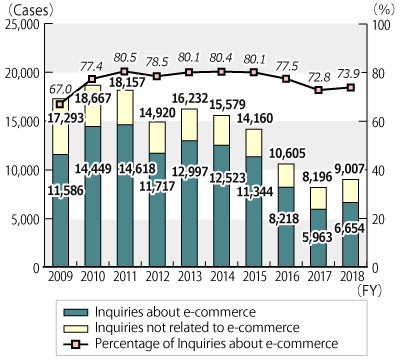Protect children from online trouble as family members! Trouble can be triggered by online game, adult website, regular purchase of health foods or cosmetics, SNS, etc.
Local consumer affairs centers and the like across Japan have received numerous inquiries about problems experienced by children (elementary, junior high, senior high students)1, over 70% of which have been related to the Internet since FY2010.
Specifically, there have been inquiries and complaints as follows: "My child secretly used my credit card to buy online game items and I was charged a hefty fee", "Adult website suddenly showed a message "registration completed" and I happened to pay money", "I intended to buy health foods and cosmetics only once, but the contract was for regular purchase, for which I cannot manage to pay", "I bought some goods through an online store or flea market, but my order was not delivered or a fake product was delivered." There are an increasing number of problems triggered by an SNS ad or an SNS acquaintance.
Therefore, NCAC decided to issue an alert to children and their carers so that children can avoid online trouble.
Diagram: Transition in annual number of inquiries about e-commerce2 out of cases where contract signatories were elementary, junior high or senior high students, registered with PIO-NET3

In FY2009, cases where contract signatories were elementary, junior high or senior high students amounted to 17,293. Of these, those related to e-commerce amounted to 11,586 67% of the whole.
In FY2010, cases where contract signatories were elementary, junior high or senior high students amounted to 18,667. Of these, those related to e-commerce amounted to 14,449 77.4% of the whole.
In FY2011, cases where contract signatories were elementary, junior high or senior high students amounted to 18,157. Of these, those related to e-commerce amounted to 14,618 80.5% of the whole.
In FY2012, cases where contract signatories were elementary, junior high or senior high students amounted to 14,920. Of these, those related to e-commerce amounted to 11,717 78.5% of the whole.
In FY2013, cases where contract signatories were elementary, junior high or senior high students amounted to 16,232. Of these, those related to e-commerce amounted to 12,997 80.1% of the whole.
In FY2014, cases where contract signatories were elementary, junior high or senior high students amounted to 15,579. Of these, those related to e-commerce amounted to 12,523 80.4% of the whole.
In FY2015, cases where contract signatories were elementary, junior high or senior high students amounted to 14,160. Of these, those related to e-commerce amounted to 11,344 80.1% of the whole.
In FY2016, cases where contract signatories were elementary, junior high or senior high students amounted to 10,605. Of these, those related to e-commerce amounted to 8,218 77.5% of the whole.
In FY2017, cases where contract signatories were elementary, junior high or senior high students amounted to 8,196. Of these, those related to e-commerce amounted to 5,963 72.8% of the whole.
In FY2018, cases where contract signatories were elementary, junior high or senior high students amounted to 9,007. Of these, those related to e-commerce amounted to 6,654 73.9% of the whole.
- 1 Inquiries about cases where contract signatories were aged 6-18 years old and were elementary, junior high or senior high students (excluding cases where the occupation field was left blank)
- 2 Transactions through the Internet and other electronic networks
- 3 PIO-NET is a database that collects information on inquiries concerning consumer affairs by linking NCAC with local consumer affairs centers and similar organizations across Japan via an online network. PIO-NET does not include inquiries referred from local consumer affairs centers to NCAC. The graph shows data registered through June 30, 2019.
Sampling of inquiries and complaints
Troubles experienced by elementary, junior high or senior high students are often related to online games, adult websites, regular purchase of health foods or other goods, online shopping sites not delivering goods or delivering fake products, interpersonal transactions, etc.
Some problems are similar to those experienced by adults: those related to adult websites, dating websites, regular purchase of health foods or other goods, mail-order websites not delivering goods or delivering fake products, interpersonal transactions, etc.
- My child used my credit card without permission to buy online game items.
- My child accidentally accessed an adult website and paid a fee charged by the site.
- I got acquainted with someone of opposite sex through a dating website, but I was not able to meet the person offline. I was fooled.
- I registered with a dating website because the site said that a high reward would be given for communicating with and advising someone, but I was cheated.
- I intended to buy cosmetics just once, but the contract was for regular purchase.
- I ordered a jacket advertised on an SNS ad, but the jacket was a fake product.
- I ordered cosmetics at a flea market, but my order was not delivered.
Advice for protecting your children from online trouble
- Talk with children to make rules for using the Internet.
- Recognize how children are using the Internet and keep your credit cards under control.
- Confirm fees, contract details, conditions for cancellation, etc.
- In case of trouble or concern, consult your local consumer affairs center.
Advice for children
- When using the Internet, follow family rules.
- To use a credit card is to use money. Do not use other's credit card without permission.
- In case of trouble, talk with your family members rather than worrying alone.
